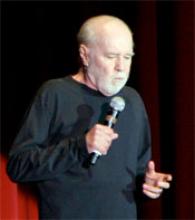By
on

Connected Nation and the utter lack of accurate maps depicting broadband options and metrics in this country reminded me of possibly my favorite comedian. George Carlin had a great routine about airlines and the safety speech given by flight attendants. In it, he has a throw-away line that continues to rattle around my head:
The safety lecture continues... "In the unlikely event…" This is a very suspect phrase! Especially, coming as it does, from an industry that is willing to lie about arrival and departure times!After reading Larry Press' account of ordering DSL from Verizon, I couldn't help but wish George Carlin were still with us and also a giant broadband geek. Larry Press' account on dealing with Verizon should be read in full, but this is what got me thinking:
Last week I ordered 7 mbps service from Verizon, but, after they switched it on, I was only getting about 1.5 mbps. I assume there were tons of retransmission errors due to an overly aggressive modulation scheme. When I called to complain, a Verizon "technician" kept me on the phone … [and finally] got his bosses permission to schedule a "truck roll" to come to my house and fix the problem. The minute the driver arrived, he told me that, at 9,000 feet from my central office, there was no way I was going to get 7 mbps.We have long known that Verizon and similar companies are similarly willing to lie about their available broadband speeds (yah, I know, I'm no Carlin). As I recently testified in a MN House hearing, the Connected Nation maps systematically overstate available broadband (particularly for DSL). And of course they do - Verizon doesn't even know what it can achieve at each premises (thought it damn well should know what it cannot offer 9,000 feet from the DSLAM). The dumb question is: Does Verizon actually maintain a database of what it could really offer, in real world conditions, to each house (or what speeds are actually achieved when they take service). It might, but they may still just market faster speeds assuming (correctly) that most people will not know the difference between what they order and what they receive. But the better question is: Why do we allow companies who act so consistently against the public interest to monopolize the key communications infrastructure of our era? Verizon's interest is in being profitable. Our interest is in having an infrastructure to support our well-being. These have proven to be irreconcilable interests. Smart communities invest in self-determination with a network that meets their needs. Unfortunately, the lies of companies like Verizon, and in the case of North Carolina, AT&T, allow legislators like Senator Hoyle to make ridiculous claims that everyone in North Carolina has access to broadband.
Hoyle says broadband access is not an issue in the state. "I've heard that BS, and it's just not true—period," he said. "Anybody that needs service has got served in this state and will continue to get served."He cited the maps of Connected Nation, which are unreliable and use far too slow a definition for broadband. We may not need good maps to make good policy, but bad maps sure embolden those who want to maintain or expand poor policy.
Photo, Courtesy of Flickr's SarahinVegas.
Geoterm







